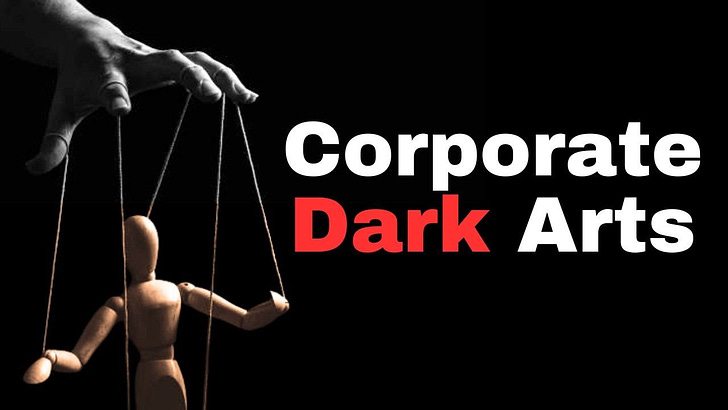The Dark Art of Public Manipulation
Have you ever wondered on the existence of shady organizations devoted to manipulating public opinion on behalf of the rich and powerful? It's time to talk about the dark arts of Public Relations.
There is a shadowy group of powerful people who expend vast resources to alter public opinion and it's not the Illuminati. In fact, if you want to know about these tactics, you don't need to look any farther than the white-shoed public relations firms that have been doing it in the open for at least half a century. On this week's episode, I talk to David Chamberlin, a PR executive at the law firm Orrik who has seen the dark side of public relations up close and personally.
The context of this piece is at least a little ironic, considering that I was planning to release my exposé about Chris Ashenden, founder of the supplement company AG1, today instead of this interview. However, after I got in touch with AG1 for a comment I was soon inundated by emails from their PR and legal teams who clearly do not want that story to see the light of day. So today’s newsletter is going to be an exciting example of how what Chamberlin and I talked about in the show is playing out in real time in my work right now.
Let me state this with emphasis:
AG1 absolutely does not want anyone to read this 2011 judgement (link) against Chris Ashenden. AG1 DOES NOT WANT anyone to read this press release from the New Zealand Commerce Commission.
That’s because these documents shed light on how Ashenden’s previous failed real estate scheme resulted in people being “lured into commitments which were a recipe for disasters in which they lost everything they had put into the property they were seeking to acquire - indeed were given to understand they had acquired.”
AG1 does not want people to know that, “There are, in this offending, strong elements of cynicism and the calculated exploitation of people struggling financially.”
The judgement states that on “14 September 2010 convictions were entered against each of the above three defendants on all charges” (which included Ashenden).
Frustratingly, the judgement linked above does not detail exactly what those charges were, only that they were “breaches” of the New Zealand Fair Trading Act. After relocating to the United States during the court proceedings to ultimately found AG1, Ashenden ended up paying all of his court restitutions and fines of $182,721.62 by September 22, 2014. This corrective action occurred after AG1 was already taking off and generating impressive profits. I have found no evidence that Ashenden ever had a warrant out for his arrest.
AG1’s legal team is adamant that Ashenden was never convicted of a crime.
To further that point, AG1 provided me with a 2019 statement from the NZ Department of Justice that stated Ashenden had no convictions on his record. They suggested that if I used the word “convicted” in my social media posts that I would be potentially defaming their client. (In American jurisprudence the word “convicted” is reserved for criminal offenses and “liable” is for civil ones. At the time of our correspondence, it was not clear if it was different in New Zealand.)
It’s worth noting at this point that the legal team that AG1 hired wasn’t just any defamation lawyer off the street. Meier Watkins Phillips Pusch is arguably the top defamation firm in the country. My correspondent is the founding partner. Megan Meier recently won a historic $787 million defamation settlement against Fox News in the Dominion voting machine case. Her bio states she has “nixed false stories before they were published and has scored countless corrections and retractions from the national media.”
Those are some big guns for a newsletter that now has 29 *amazing* paid subscribers and a YouTube channel whose videos rarely crack more than 2000 views.
Naturally, I took their various protests seriously and in good faith made several edits to thumbnails, titles, a URL that included the word “fraud” by default, and sent clarifications to other journalists who were picking up on the story. I re-recorded parts of the video within a few hours of receiving their letter.
Now, on further investigation, it is not immediately clear to me if the letter they provided stating that Ashenden was never convicted of a crime was meaningful. New Zealand’s 2004 Clean Slate Act conceals convictions after a period of 7 years, and the trial occurred 9 year earlier than the date on their letter.
There were also several statements in the judgement—and other documents I uncovered late last night—which indicate criminal charges were at least in the mix at one point:
Keep reading with a 7-day free trial
Subscribe to Magnetic North: One Journalist's Quest to Make Sense of the Universe to keep reading this post and get 7 days of free access to the full post archives.



